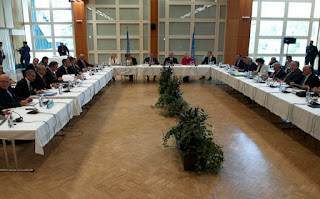The European Union looks to the East
The European Union (EU) is on the move as every organization or entity that respects itself should be. In this particular case, it is attempting to redefine or, more precisely, to recalibrate its relations with its neighbours to the East and South. It has been in part urged on by the German Presidency of the first half of 2007 which has an interest in placing relations with Union’s neighbours to the east as well as the “neighbours of the neighbours”(the five Central Asian republics) on a new upgraded footing. In particular, in the wider Black Sea area, a number of issues of importance to the EU stand out.
Necessity is a motivator as well. The completion of the 2004 enlargement with the accession of Bulgaria and Romania on 1 January 2007 has made the EU a Black Sea entity. This in turn implies the formulation and implementation of a policy designed to address EU concerns in this part of its neighbourhoods.
Of particular relevance is the security dimension – especially with regard to the security of the EU’s energy supplies. In fact, over 80% of the energy supply to Europe transits through the wider Black Sea area.
The region is a transit area for organized crime, especially trafficking in human beings and drugs. Curbing such criminal activities is of vital importance as these undermine rule of law and the establishment of viable institutions in the countries of the region. It should be noted that in its European Security Strategy of December 2003, the EU explicitly called for the need to help in having “a ring of well-governed states” around its periphery.
The wider Black Sea area is home to a number of transmittable diseases that eventually find their way to the territories of EU member states.
The region hosts a number of “frozen conflicts”, such as those in Transnistria, Abkhazia, South Ossetia, and Nagorno-Karabakh, whose resolution is imperative if the region is to acquire a modicum of stability, prosperity and “well-governed states”.
Finally, the wider Black Sea area presents an added incentive since it allows for interaction and possible cooperation with the regional powerhouse – Russia.
What does all this new interest in the EU’s neighbourhood entail?
An assessment of European Neighbourhood Policy (ENP) after two years of activity – attempting to improve its content whilst keeping in mind the realities of no imminent round of enlargement. This requires the formulation of an ENP+ that neither closes the door to those countries that aspire to join the EU nor does it open it further but would allow for the active and willing neighbours to upgrade further their relations with the Union.
Creating a multilateral framework for the region in order to complement the bilateral focus of the various bilateral ENP Action Plans. Much as such a multilateral framework exists in the South with the Euro-Mediterranean Partnership and the North with the Northern Dimension, the EU has initiated a Black Sea Synergy intended to develop and promote cooperation both with and within the region. While funds totalling over 11 billion Euro under ENP for the period 2007-2013 have already been allocated with the lion’s share (about 65%) earmarked for the South and the rest for the eastern neighbours, the EU has to tread carefully in that its renewed interest in the East has made promoters of the Mediterranean dimension, such as Spain and Portugal, uneasy with the shifting strategic focus of the EU.
Ascertaining the linkages of the Black Sea region with that of South Eastern Europe given that membership in both regions overlaps. Countries like Romania, Bulgaria, Greece, Turkey (as well as Serbia and Albania as member states of the Organization of Black Sea Economic Cooperation) need to link the rationale for involvement and cooperation within one region with the other.
Related to the above, a number of areas of potential synergies are cross-regional including energy, transport, environmental concerns, combating crime, promoting good governance, removing obstacles to trade and investment, and cooperation in the field of tourism, among others.
In particular the South Eastern Europe example provides for the potential of extending the Energy Community Treaty to some countries of the wider Black Sea region such as Ukraine and Moldova and for attempting to establish a free trade zone in the wider Black Sea area for the countries that are not EU members (Greece, Romania and Bulgaria) or those that have a customs union agreement with the EU (Turkey).
The EU has the potential to become an honest broker in the “frozen conflicts”, as its process of Europeanization slowly seeps in the region and affects states and separatists alike.
Finally, the Union’s more active engagement in the wider Black Sea area creates the opportunity for further symbiosis with the Russian Federation whose current policy is one of greater interaction with the EU. The issue of energy cooperation obviously stands out but the potential for dialogue, cooperation and coordination in a number of other fields is present as well.
The European Union is on the move with a full agenda that will in all likelihood grow as more synergies are bound to be created from enhanced interaction. There are challenges aplenty but the rewards of extending the zone of stability, security and economic prosperity probably make this new effort a worthwhile one for all stakeholders involved. It is now time to begin acting on the potential at hand.


Comments